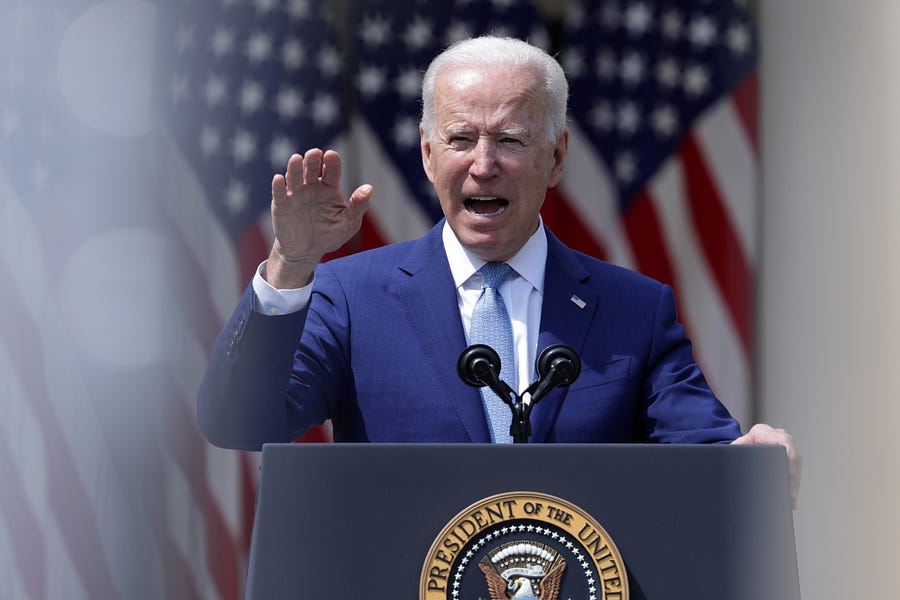The debate over gun control has been so pointless for so long that even to make note of its futility has become pointless itself. It’s like art-house cinema: nonsensical but annoyingly derivative and going nowhere fast. That’s what happens when people don’t want to get to the point—which President Biden and most of his fellow Democrats certainly do not want to do.
We’ve been on repeat for nearly 30 years now, with Biden’s new suite of firearms proposals just the latest remix. The president knows. He was there when the template was set in 1994 with the federal weapons restrictions he helped pass as a senator. The legislation was part of an enormous crime bill approved with bipartisan support—the same legislation Biden spent much of 2020 atoning for because of its increased federal prison sentences for drug offenders.
The “assault-style weapons ban” component was passed in response to a series of mass murders, particularly the 1991 massacre that left 23 dead at a Luby’s Cafeteria in Central Texas. But what advocates believed was strong public demand for federal restrictions on semiautomatic weapons and ammunition capacity was a mirage. While voters were indeed alarmed about the crime wave of the era—New York City had 2,245 murders in 1990 compared with 462 last year—the weapons limits immediately turned into a political liability for their proponents. This was the beginning of the two-decade heyday of the National Rifle Association and, as it was with many issues at the time, a sharp turn toward partisan orthodoxy.
The NRA’s opposition to the ban helped Republicans retake the House later that year, and both parties quickly absorbed the lesson. Republicans became Second Amendment fundamentalists and Democrats in red states and swing states learned to shut up about firearms—when they weren’t being openly supportive of gun rights. When subsequent mass murders, like the 1999 Columbine High School killings in Colorado, were carried out with weapons that were legal under the restrictions, it further undermined the case for the ban. Unlike the harsh new sentencing rules in the 1994 law, there was little evidence to support that restricting such firearms had reduced crime of any kind. The ban was allowed to expire in 2004.
After that, the gun debate became a grim series of reruns. In the wake of a mass shooting, gun-control advocates would call for a resumption of firearms restrictions and propose new controls at the edges—more background checks, etc.—but found few takers. Democrats were happy to accept the votes and contributions of gun-control proponents but avoided substantive action. In 2013, then-Senate Majority Leader Harry Reid scuttled gun legislation supported by then-President Barack Obama in response to the Sandy Hook Elementary School massacre as their party faced a challenging Senate map for 2014. Reid likely acted too late to avoid the consequences. Three of the five Senate Democrats who lost their seats that year had backed a failed effort to expand background checks before Reid pulled the plug.
But gun control advocates didn’t change course. Led by former New York Mayor Mike Bloomberg, the push intensified for marginal gun-control laws in the model of the 1994 ban. Their emphasis remains on what they call “common sense” restrictions and other euphemisms like “gun safety” similar to the ones Biden put forward last week. Gun-control advocates know that cracking down on 3-D printed guns or restricting stabilizers for pistols wouldn’t make a dent in America’s gun deaths—about 40,000 homicides, suicides, and accidents a year by CDC estimates. Even the legislation considered to be at the restrictive fringe of the House Democratic conference wouldn’t likely do much. Biden’s blue-ribbon commissions and micro-mini executive orders are strictly chicken feed.
These patronizing proposals are a reflection of Democrats’ desires to please base voters without further jeopardizing paper-thin majorities in both houses of Congress. But they’re also a reflection of the legal obstacles Democrats know they face. A Supreme Court substantially more inclined toward government power than the current one rendered the 2008 Heller decision that made clear the Second Amendment is for individuals, not just well-regulated militias. Indeed, the legal wind may be blowing against the restrictionists.
There is a logical answer for contentious issues like these, of course: a constitutional amendment restricting the right to keep and bear arms. But don’t hold your breath on that one. Unlike other potential amendments—term limits, budget caps, etc.—the problem here is not members of Congress blockading measures that might be popular in the states but that would weaken their power or federal authority. This is about members refusing to put forward an amendment that would surely be defeated by a populace that has clearly come down on the side of being a gun-owning nation.
The truth here is that Democrats are doing base service by rerunning the same old movie. Biden knows. He was there for the original.







Please note that we at The Dispatch hold ourselves, our work, and our commenters to a higher standard than other places on the internet. We welcome comments that foster genuine debate or discussion—including comments critical of us or our work—but responses that include ad hominem attacks on fellow Dispatch members or are intended to stoke fear and anger may be moderated.
With your membership, you only have the ability to comment on The Morning Dispatch articles. Consider upgrading to join the conversation everywhere.